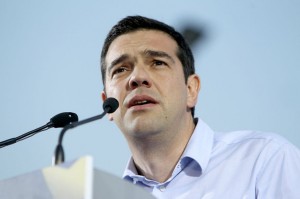Tsipras and the Atheists: The Role of Secularism in Greece’s Financial Crisis
 Alexis Tsipras, Prime Minister of Greece and leader of the Syriza Party
Alexis Tsipras, Prime Minister of Greece and leader of the Syriza Party The current state of Greece is not a good one—that much is not news. The financial crisis that’s plagued the country for years seemed to come to a head on July 5, 2015, when the Grecian public overwhelmingly voted “no” on a referendum that would increase austerity measures and leave them at the mercy of the Eurozone. It was the proud declaration of a Greek independence from international debt collectors, though it also meant embracing the possibility of further economic collapse and an exit from the Eurozone. However, merely a week after the vote, Prime Minister of Greece Alexis Tsipras—who rallied for a “no” vote to begin with—returned to European leaders with a request for what would be Greece’s third bailout. This request included a proposal to enact some of the previously rejected and harshest austerity measures yet. Yesterday, July 13, Greece and its creditors officially arrived at a deal, and Tsipras has until tomorrow to sign the outlined reforms into legislation.
From a humanist perspective, however, there’s a bit more going on here than economic collapse—which is not to dismiss the severity of the collapse or to downplay the humanitarian crises that it’s engendered. But under Tsipras’ leadership, the Syriza party has also begun a strident march towards secularism and away from Greek theocracy and the political supremacy of the Greek Orthodox Church. It wouldn’t be the first time a radically leftist government sought to weaken the influence of an official state church, and here as in other cases, we see economic and political issues linked inextricably to cultural and religious ones. The fate of economic stability in Greece may, in some ways, depend on how successfully it can pry off the long-ossified fingers of its religious overlords.
To that point: there is no separation of church and state in Greece. Quite the opposite, in fact. Leaders of the Orthodox Church are present for, and often preside over, most political ceremonies; like us, they swear oaths of office on a Bible; priests and other clerical figures are all on the state payroll; and Christian theology lessons and state-sanctioned prayer breaks are mandatory in all public schools. Most citizens believe that baptism is necessary for citizenry (it isn’t), and, much like our setup here in the US, all religious institutions are tax-exempt. These are privileges that are historically entrenched and all-but-guaranteed by a constitution that essentially declares Orthodox Christianity the official state religion.
It’s no wonder that Tsipras made headlines first by openly and proudly declaring his atheism and later by choosing to be sworn into office in a secular ceremony—one conspicuously void of clerical authority or religious paraphernalia. This made him both the country’s first-ever atheist prime minister and the first to break with the centuries-old tradition of being sworn in under the watchful gaze of the Church’s figurehead.
Despite—or perhaps because of—his ardent nonbelief, Tsipras has made efforts to maintain a strained but cordial relationship with the Church. But that might soon be changing. In an effort to both cut government expenditure and increase revenue, many have called for a reevaluation of the church/state relationship—a move that would not exactly be in the Church’s favor. Last week, in a fiery speech directed at Tsipras, Member of the European Parliament Guy Verhofstadt demanded an end to “the privileges of ship owners, the military, [and] of the Orthodox Church.” This he demanded as part of a comprehensive reform package that would work towards salvaging and rebuilding the Grecian economy. It’s a reform measure that would entail, among other things, ending the government subsidy of religious institutions and their activities, ending their tax-exempt status, removing all religious figures from the state payroll, and scrutinizing some of their shadier property claims—a devastating blow to a Church that has long thrived off a never-ending supply of state-sanctioned resources and a declarative victory for secularism in the Mediterranean. Some atheist and secular groups—like the Atheist Union of Greece— have been protesting in support of those very ends.
It’s worth noting, too, that the link between church and state in Greece is not necessarily indicative of the religious tendencies of the public. That an openly atheist prime minister, who was neither baptized nor wed in a religious ceremony and who is aligned with a firmly atheistic party, could be elected at all suggests a public opinion on religion that is widely more progressive than ours here in the United States. Greece is, after all, the long-held birthplace of scientific reason, and one hopes that they can continue on in that tradition towards a secularism that aids in the restoration of their country and its people.
